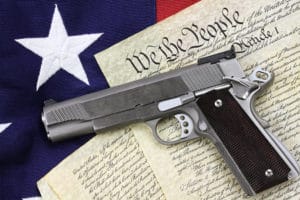Abraham Lincoln once said, “Our safety, our liberty, depends upon preserving the Constitution of the United States as our fathers made it inviolate. The people of the United States are the rightful masters of both Congress and the courts, not to overthrow the Constitution, but to overthrow the men who pervert the Constitution.”
Unfortunately, governors across this nation have perverted the Constitution with unprecedented orders restricting Americans’ rights to peaceably assemble, practice their religions, earn a living, travel freely, engage in commerce, and even manage their own health and exposure to risk. While global pandemics pose challenges for governors, entire populations cannot be indefinitely subjected to tyranny and deprived of fundamental rights and liberties.
Thankfully, a Pennsylvania federal court judge recently ruled in County of Butler v. Wolf, No. 2:20-CV-677, that lockdown restrictions imposed by Pennsylvania Gov. Tom Wolf, including a ban on large gatherings and the closure of “non-life sustaining businesses,” are unconstitutional.
Specifically, Judge William Stickman IV declared:
- that the congregate gathering limits imposed by the governor’s orders violate the right of assembly enshrined in the First Amendment;
- that the stay-at-home and business closure components of Defendants’ orders violate the Due Process Clause of the Fourteenth Amendment; and
- that the business closure components of Defendants’ orders violate the Equal Protection Clause of the Fourteenth Amendment.
Judge Stickman noted that, while the orders may have been well intentioned, good intentions are not enough to meet Constitutional scrutiny. He goes on to say that, “Indeed, the greatest threats to our system of constitutional liberties may arise when the ends are laudable and the intent is good-especially in time of emergency.”
While the government defendants argued that Constitutional scrutiny should be suspended because the orders were put in place during a time of emergency, the court found that:
Using the normal levels of constitutional scrutiny in emergency circumstances does not prevent governments from taking extraordinary actions to face extraordinary situations…
The application of normal scrutiny will only require the government to respect the fact that the Constitution applies even in times of emergency. As the Supreme Court has observed: “[t]he Constitution was adopted in a period of grave emergency. Its grants of power to the federal government and its limitations of the power of the States were determined in the light of emergency, and they are not altered by emergency.” Home Building & Loan Ass ‘n. v. Blaisdell, 290 U.S. 398, 425 (1934).
Ultimately, the Court concludes that lockdowns are so draconian that they are nearly “presumptively unconstitutional”:
The stay-at-home components of Defendant’s orders were and are unconstitutional. Broad population-wide lockdowns are such a dramatic inversion of the concept of liberty in a free society as to be nearly presumptively unconstitutional unless the government can truly demonstrate that they burden no more liberty than is reasonably necessary to achieve an important government end. The draconian nature of lockdown may render this a high bar, indeed.
The burden of proof that “lockdown” is crucial to achieve a substantiated goal rests with the government. The burden does not rest with the people to disprove the necessity of lockdown.
6634412-0-27590





